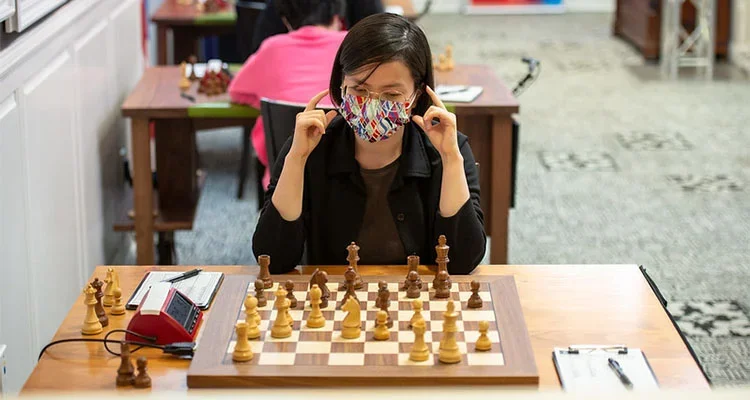
The second half of the 2021 U.S. Junior, Girls and Senior Championships begins Thursday afternoon in St. Louis, with each title fight shaping up for some endgame drama. After five rounds, contenders have shown themselves in all three events, and now several games within the remaining four round can be circled as potential disruptors to the current standings.
This year’s Junior Girls event might finish with the bloodiest ending, where every player in the field has shown she is capable of both winning and losing. With three-time Junior Girls Champion IM Carissa Yip over in Sochi, Russia playing the 2021 Women’s World Cup, the chance for the U.S. Girls crown to sit atop a new head has produced a fierce slugfest atop the standings.
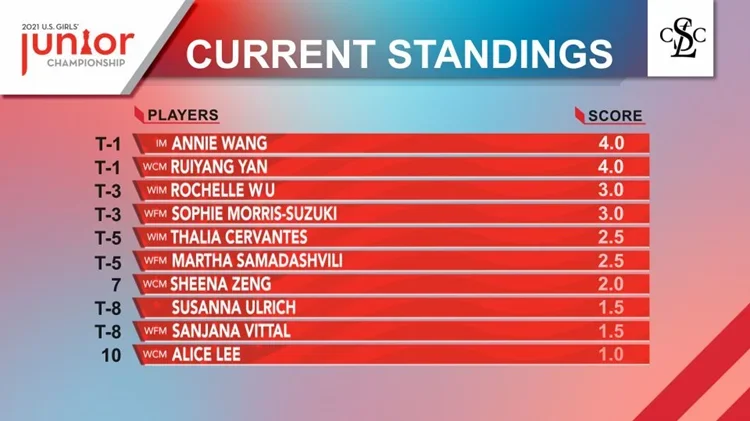
Top-seed IM Annie Wang was and still is the natural leader, though her perfect streak came crashing back to earth in round 4 at the hands of WIM Rochelle Wu, helping to logjam the standings. In fact, the 15-year-old Wu is responsible for the only loss of the other co-leader, WCM Ruiyang Yan, who along with Wang has turned in a decisive 4/5 performance through the first half.
Proving parity within this year’s Girls Championship, however, after two big wins Wu herself became the victim of upset on Tuesday, dropping her game to tournament wildcard Susanna Ulrich in the U.S. Junior Girls Round 5 Game of the Day, annotated by FM Robert Shlyakhtenko.
[pgn][Event "US Girls champs"] [Site "?"] [Date "2021.07.20"] [Round "?"] [White "Ulrich, Susanna"] [Black "Wu, Rochelle"] [Result "1-0"] [ECO "E36"] [Annotator "Shlyakhtenko,Robert"] [PlyCount "85"] [EventDate "2021.07.17"] {[%evp 0,85,25,26,18,-17,3,2,30,-14,0,-11,-4,-25,9,-26,16,40,5,-12,16,7,40,36, 14,-1,66,38,38,42,42,48,60,61,61,61,63,55,61,49,105,106,127,106,81,88,110,111, 116,116,123,114,114,121,133,134,125,139,149,149,137,138,287,300,303,173,204, 207,223,199,244,292,328,308,344,348,348,371,370,299,370,373,439,446,644,653, 684,686]} 1. d4 Nf6 2. c4 e6 3. Nc3 Bb4 4. Qc2 O-O 5. a3 Bxc3+ 6. Qxc3 d5 7. Nf3 dxc4 8. Qxc4 b6 9. h4 $5 {This was Kasparov's idea, which he played twice after his return in 2017. Coincidentally, both games were also played in...St. Louis! White judges that her center is solid enough and starts probing for kingside weaknesses.} c5 {The most natural reaction.} 10. dxc5 Ba6 11. Qc2 bxc5 12. h5 Nc6 $2 {A very serious mistake in an unfamiliar position. Weakening the kingside dark squares like this is a huge commitment.} ({In the only previous game to reach this position, black played the correct} 12... h6 $1 {but still lost:} 13. g4 $1 {(the most energetic)} Nxg4 14. Rg1 f5 15. Bh3 Qe8 $2 (15... Nc6 {was better, with an unclear position.}) 16. Bxg4 fxg4 17. Bxh6 $3 { The only refutation, and a beautiful one.} Qxh5 18. Bxg7 Kxg7 19. Qe4 $18 { 1-0 (27) Sarkar,J (2366)-Park,E (2207) Charlotte 2021}) 13. h6 g6 {White has a positional advantage because black lacks a dark-squared bishop to protect the kingside, reminiscent of a Grunfeld gone wrong. This absence means that the c5-pawn also becomes very weak. Thus, white is clearly better as long as she manages to keep black's knights at bay and coordinate the pieces. Urlich accomplishes all of these things with powerful play.} 14. Bg5 $1 {Of course there is no sense in taking the c5-pawn without any development. White focuses on developing the pieces first.} Qa5+ ({Black's situation is not improved by} 14... Nd4 15. Nxd4 cxd4 16. Rh4 $1 {, targetting the d4-pawn and creating ideas of Rf4.}) 15. Bd2 Qb6 16. e3 {Controlling the d4-square, which was the only possible basis for black counterplay.} Bxf1 17. Kxf1 $1 {The correct recapture. As we have seen, the rook will be activated via the fourth rank, and white's king will be very safe on g1.} Rfd8 18. Rc1 Rac8 ({Nothing much is changed by} 18... Rab8 19. Rh4 {and black cannot capture on b2 because of the exchange of queens followed by Bc3.}) 19. Rh4 $1 {After great play in the early middlegame, white is already virtually winning. All the pieces come into play and white's positional advantages are still there.} e5 {Trying to create counterplay with ...e4. There was little choice, as after other moves black would have slowly been squeezed; but in the end black only creates more weaknesses.} 20. Rc4 e4 21. Ng5 ({Even more accurate was} 21. Bc3 $1 exf3 22. Bxf6 fxg2+ 23. Kg1 Rd6 24. Qc3 {with a won position.}) 21... Ne5 22. Rxc5 { Black would be alright if not for this move, which shows another benefit of h5-h6 -- black's back rank is permanently weak.} Rxc5 23. Qxc5 Qxb2 24. Qb4 $1 Qa2 25. Qd6 $1 {Good calculation. Black's pieces are pushed back.} Ned7 26. Qc7 $5 {Preparing to trade queens on c4, thereby eliminating all counterplay.} Re8 ({or} 26... Rf8 27. Bb4 Re8 28. Qc4) 27. Qc4 Qxc4+ 28. Rxc4 {Despite the equal material, the endgame is completely winning for white. Black has four weaknesses (a7, e4, f7, and h7) and no way to deal with them all.} Nb6 29. Rc7 Nfd7 30. Ba5 {With the trade on b6 white eliminates a defender and wins a pawn. } (30. Rxa7 f6 {is less accurate.}) 30... Re5 31. Bxb6 Nxb6 32. Nxf7 {More than sufficient.} ({But} 32. Rb7 $1 {was a bit nicer.}) 32... Rd5 33. Rxa7 Nc4 34. a4 Rf5 35. Nd8 Nxe3+ 36. Kg1 Ng4 37. Rg7+ Kf8 38. Ne6+ Ke8 39. Nc7+ { White was very low on time and repeats moves to reach the time control.} Kd8 40. Ne6+ Ke8 41. Rxh7 Ra5 ({or} 41... Rxf2 42. Rh8+ Ke7 43. h7 Rc2 44. Rf8 $1) 42. Rh8+ Ke7 43. h7 {A great win to shake up the standings.} 1-0 [/pgn]
The second half of the 2021 U.S. Girls Championship will see some definition to its standings early, as Wu looks to separate from WFM Sophie Morris-Suzuki, both tied at 3/5 in second place and paired in Thursday’s round 6. Morris-Suzuki's mettle will be put to the test in the tournament’s second half, following with a round 7 match against leader Yan on Friday, and then the field’s second seed FM Thalia Cervantes on Saturday. Wang has perhaps the easiest schedule down the stretch, having already played through the top seeds, though if Yan continues her hot pace to the end, the two will meet in the ninth and final round.
U.S. Junior Championship
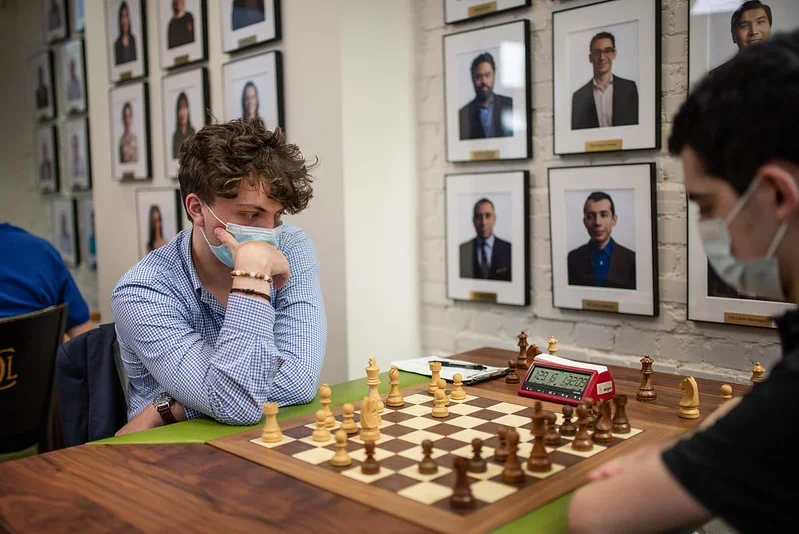
Only two players remain without a loss after five rounds in the U.S. Junior Championship: GM Hans Moke Niemann, plus-three with the clear lead at 4/5, and the reigning Junior Champion GM John Burke, a half-point behind at plus-two. Niemann played White when he met Burke in their pivotal matchup in Tuesday’s fifth round, though both GMs seemed content with the half-point in an uneventful English.
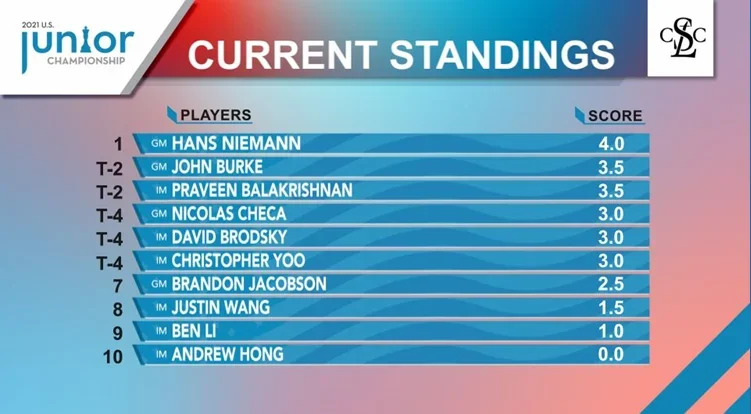
The draw up top allowed momentum for the chasers, as IM Praveen Balakrishnan won a big game against IM Christopher Yoo to join Burke in second place at 3.5/5. After losing to Niemann in the second round, Balakrishnan is right back in the mix after a draw with top-seed GM Nicolas Checa and Tuesday’s victory over Yoo, the U.S. Junior Round 5 Game of the Day, annotated by FM Robert Shlyakhtenko.
[pgn][Event "US Junior champs"] [Site "?"] [Date "2021.07.20"] [Round "?"] [White "Yoo, Christopher"] [Black "Balakrishnan, Praveen"] [Result "0-1"] [ECO "D43"] [Annotator "Shlyakhtenko,Robert"] [PlyCount "84"] [EventDate "2021.07.17"] 1. d4 d5 2. c4 c6 3. Nc3 Nf6 4. Nf3 e6 5. Bg5 h6 6. Bxf6 Qxf6 7. e3 Nd7 8. Bd3 {Christopher had already essayed this line in Round 1, against Andrew Hong, but now black deviates.} dxc4 9. Bxc4 Bd6 {This was Schandorff's recommendation in his Semi-Slav book from 2015. This is more solid but less ambitious than putting the bishop on g7.} 10. O-O Qe7 {In preparation for Ne4. Now white began to think.} 11. e4 {One of many possible moves.} e5 12. d5 Nb6 13. dxc6 bxc6 (13... Nxc4 {is not possible, since white wins back the piece and a pawn with} 14. Nd5 Qd8 15. cxb7 Bxb7 16. Qa4+) 14. Be2 O-O 15. Qc2 Bg4 16. Nd1 $6 {This is a very natural regrouping, but I would venture to call it an inaccuracy here. The problem is that white does not take into consideration black's ideas, and allows him to carry out the strong maneuver ...Bc5-d4.} ({ Instead, it's better to play} 16. Rac1 Rac8 (16... Bc5 $2 17. Nxe5 $1 Bxe2 18. Nxc6 Qc7 19. Nxe2 {is the point.}) 17. Nd1 {with chances for an advantage, ½-½ (70) Mikhalevski,V (2531)-Kharlov,A (2638) Moscow 2002}) 16... Bc5 $1 { After this I would already prefer to play black. He will take on f3 and reach an opposite colored position where his bishop is clearly superior.} 17. Rc1 Bxf3 18. Bxf3 Bd4 19. Qe2 (19. Qxc6 {never works in view of} Rac8) 19... c5 $15 {White can never dislodge the bishop from d4.} 20. Ne3 g6 {Preventing Nf5.} 21. g3 ({White could have tried to resolve his problems with} 21. Qc2 {, intending Be2 and Nc4. However, after} a5 $5 22. Be2 a4 23. Nc4 Nd7 $1 {this attempt is not successful.}) 21... Qe6 $6 {I think this move is not concrete enough. White is planning to play b2-b3 and Nc2 followed by Nxd4. Black could of course recapture with ...exd4, but this approach entails some risk: white can later advance the kingside pawn majority with Bg2 and f2-f4. Thus black will most likely play ...cxd4, at which point white will try to penetrate on the c-file and attack the weak a-pawn.} ({In view of the above remarks, it becomes clear that black should have played} 21... a5 $1 22. b3 a4 {, trading off a potential weakness. Now it's a different story:} 23. Nc2 axb3 24. axb3 Kg7 $5 25. Nxd4 cxd4 26. Qb5 Rfb8 $17 {, and black has both an open a-file and a weakness on b3 to work with.}) 22. b3 a5 23. Nc2 Rfd8 24. Nxd4 cxd4 25. Qb5 { With the a-pawns still on the board, white has good chances.} Rd6 ({Black should have been more careful and played} 25... Nc8 {, preparing to expel white's queen with ...Nd6.}) 26. Rc5 $6 ({I do not see what could be wrong with } 26. Rc7 {, preparing to double on the c-file. ...d3 is never dangerous, and, crucially, white can meet} a4 {with} 27. Bd1 $1 {and the trade on b3 only activates white's bishop and helps white create a passed pawn.}) 26... Nd7 27. Rd5 $6 {A very strange decision. White gives black two mobile central pawns for no clear compensation.} ({After} 27. Rc7 {white is still not risking anything.}) 27... Rxd5 28. exd5 Qf5 {A critical moment. Given a few moves, black will start pushing the central pawns and white will have no effective counterplay. This was the moment for white to find something.} 29. Be2 $6 ({ White absolutely had to activate the bishop with} 29. d6 {, and no advantage for black is evident.} e4 30. Qc6 $1 Re8 (30... exf3 31. Qxa8+ Kg7 32. h3 $5 Ne5 33. Kh2 {and white will not get mated.}) 31. Re1 {with an unclear position. These lines are not easy to calculate, but when you are positionally worse, it is of utmost importance to complicate the position and find resources like this.}) 29... Rb8 {Getting ready to the push the pawns.} (29... e4 $2 {would be a huge blunder because of} 30. g4 $1) 30. Qc6 (30. Qxa5 d3 31. Bd1 e4 { is suddenly very dangerous for white.}) 30... Nf6 31. Bc4 e4 32. d6 $2 { This natural move turns out to be the decisive mistake.} ({White had to first play} 32. f3 $3 exf3 (32... e3 33. Qc5 $1 {(now there is no ...Ng4!)} Qe5 34. f4 Qe4 35. Qd6 $1 {with an unclear position.}) 33. d6 {, which is a much better version for white. The f-file is opened and ...Ng4 ideas are no longer as dangerous.} Ng4 (33... Qe4 34. Bxf7+ $1 Kxf7 35. Qc7+ Ke6 36. Qxb8 Qe2 37. Rf2 {gives black no more than a draw.}) 34. Rxf3 Qb1+ 35. Rf1 Qxa2 36. Rxf7 { and it seems that white is surviving. He has activated the worst-placed piece (the f1-rook) and successfully taken advantage of black's main weakness (the f7-pawn).} ({even} 36. Qh1 $5 {is possible.})) 32... d3 33. Qc7 Rf8 {Now white is losing, because his rook is out of the game and he cannot find targets in black's position. Black simply threatens ...Qh3 followed by ...Ng4.} 34. Qb7 h5 (34... Qh3 $2 35. f3 $1 {was white's idea.}) 35. Qb5 Qh3 36. f3 exf3 37. Rxf3 { Now it's a case of too little and too late.} Ng4 38. Bxf7+ Kg7 $1 39. Rf2 Nxf2 40. Qe5+ Kxf7 41. Qe7+ Kg8 42. d7 Qf5 0-1 [/pgn]
The second half of the 2021 U.S. Junior looks great for drama, including a juicy penultimate round 8 that pits Balakrishnan-Burke and Yoo-Niemann.
U.S. Senior Championship

If anyone over the age of 50 wants to catch GM Gregory Kaidanov, they had better do it soon. The legend has led the 2021 U.S. Senior Championship from its onset, clear first after five rounds with 4.5/5.
One last hope might be for GM Larry Christiansen, who sits a half-point behind Kaidanov, with the two scheduled to play in Friday’s round 7 – though if it doesn’t happen there, we may be prepping for a new U.S. Senior Champion in 2021. After Christiansen, Kaidanov has a 1.5-point lead over GM Alex Fishbein in third place, and a 2-point lead over fourth.
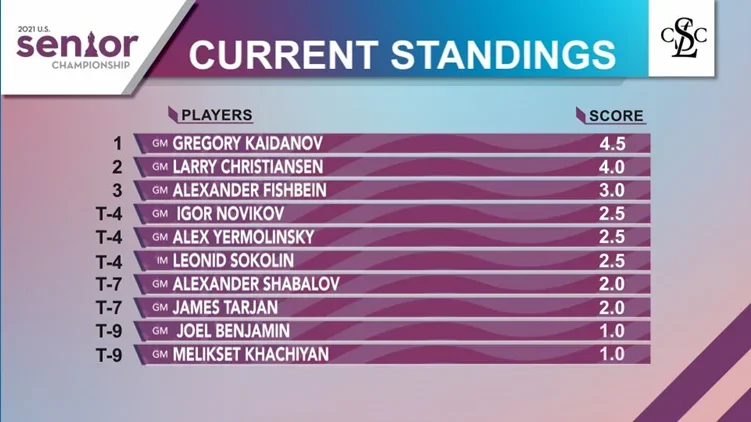
Each round of the 2021 U.S. Juniors and Senior Championships begins daily at 3:00 p.m. central time, along with live commentary from GMs Yasser Seirawan and Cristian Chirila, and host Sharon Carpenter on www.uschesschamps.com or the Saint Louis Chess Club’s YouTube and Twitch channels.
Categories
Archives
- January 2026 (6)
- December 2025 (27)
- November 2025 (29)
- October 2025 (39)
- September 2025 (27)
- August 2025 (29)
- July 2025 (43)
- June 2025 (25)
- May 2025 (24)
- April 2025 (29)
- March 2025 (29)
- February 2025 (20)
- January 2025 (24)
- December 2024 (34)
- November 2024 (18)
- October 2024 (35)
- September 2024 (23)
- August 2024 (27)
- July 2024 (44)
- June 2024 (27)
- May 2024 (31)
- April 2024 (51)
- March 2024 (34)
- February 2024 (25)
- January 2024 (26)
- December 2023 (29)
- November 2023 (26)
- October 2023 (37)
- September 2023 (27)
- August 2023 (37)
- July 2023 (47)
- June 2023 (33)
- May 2023 (37)
- April 2023 (45)
- March 2023 (37)
- February 2023 (28)
- January 2023 (31)
- December 2022 (23)
- November 2022 (32)
- October 2022 (31)
- September 2022 (19)
- August 2022 (39)
- July 2022 (32)
- June 2022 (35)
- May 2022 (21)
- April 2022 (31)
- March 2022 (33)
- February 2022 (21)
- January 2022 (27)
- December 2021 (36)
- November 2021 (34)
- October 2021 (25)
- September 2021 (25)
- August 2021 (41)
- July 2021 (36)
- June 2021 (29)
- May 2021 (29)
- April 2021 (31)
- March 2021 (33)
- February 2021 (28)
- January 2021 (29)
- December 2020 (38)
- November 2020 (40)
- October 2020 (41)
- September 2020 (35)
- August 2020 (38)
- July 2020 (36)
- June 2020 (46)
- May 2020 (42)
- April 2020 (37)
- March 2020 (60)
- February 2020 (38)
- January 2020 (45)
- December 2019 (34)
- November 2019 (35)
- October 2019 (42)
- September 2019 (45)
- August 2019 (56)
- July 2019 (44)
- June 2019 (35)
- May 2019 (40)
- April 2019 (48)
- March 2019 (61)
- February 2019 (39)
- January 2019 (30)
- December 2018 (29)
- November 2018 (51)
- October 2018 (45)
- September 2018 (29)
- August 2018 (49)
- July 2018 (35)
- June 2018 (31)
- May 2018 (39)
- April 2018 (31)
- March 2018 (26)
- February 2018 (33)
- January 2018 (30)
- December 2017 (26)
- November 2017 (24)
- October 2017 (30)
- September 2017 (30)
- August 2017 (31)
- July 2017 (28)
- June 2017 (32)
- May 2017 (26)
- April 2017 (37)
- March 2017 (28)
- February 2017 (30)
- January 2017 (27)
- December 2016 (29)
- November 2016 (24)
- October 2016 (32)
- September 2016 (31)
- August 2016 (27)
- July 2016 (24)
- June 2016 (26)
- May 2016 (19)
- April 2016 (30)
- March 2016 (36)
- February 2016 (28)
- January 2016 (32)
- December 2015 (26)
- November 2015 (23)
- October 2015 (16)
- September 2015 (28)
- August 2015 (28)
- July 2015 (6)
- June 2015 (1)
- May 2015 (2)
- April 2015 (1)
- February 2015 (3)
- January 2015 (1)
- December 2014 (1)
- July 2010 (1)
- October 1991 (1)
- August 1989 (1)
- January 1988 (1)
- December 1983 (1)







